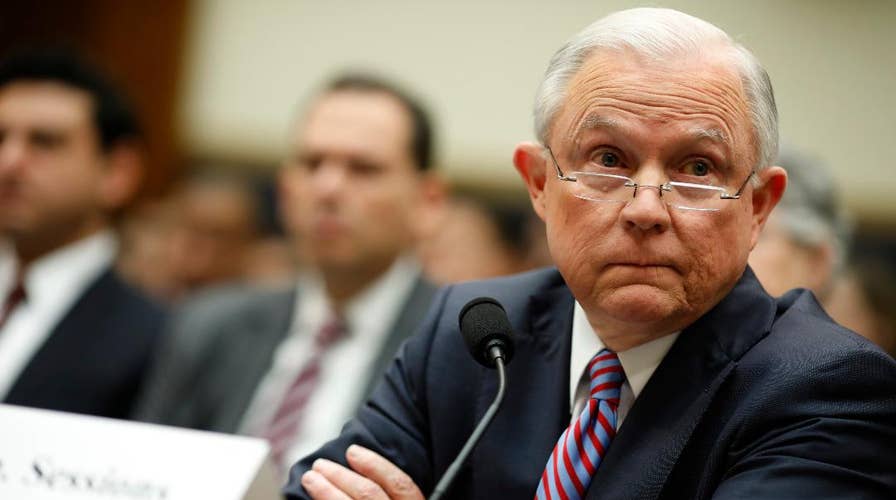Jeff Sessions grilled on Capitol Hill: What was revealed
Attorney General Jeff Sessions testified in front of a House committee and was grilled about the 2016 election, Russia collusion, immigration, drug policies and much more. Here’s a roundup of the heated hearing.
Attorney General Jeff Sessions made headlines on Tuesday, when it was reported that he was interviewed last week as part of FBI Special Counsel Robert Mueller's Russia probe.
Read on for a timeline of Sessions’ involvement with President Trump’s campaign and the Russia probe.
June 16, 2015 – Donald Trump officially announces his candidacy for president at an event in Manhattan.
February 28, 2016 – Sessions endorses Trump at a rally in Alabama, becoming the first senator to do so.
March 3, 2016 – Trump picks Sessions to lead his campaign’s National Security Advisory Committee.
March 31, 2016 – Trump’s Instagram account publishes a photo of the candidate meeting with his national security team. Aside from Trump, Sessions is pictured in the image, as well as George Papadopoulos, the former campaign adviser who later pleaded guilty to lying to the FBI.
TRUMP AND THE RUSSIA INVESTIGATION: WHAT TO KNOW
April 27, 2016 – Reports suggest Sessions may have had a private meeting with Russia’s then-ambassador to the U.S., Sergey Kislyak at the Mayflower Hotel in Washington, D.C.
Sessions later denies having any private meetings while at the hotel for Trump's speech.
July 2016 – Sessions meets with Kislyak during the Republican National Convention in Ohio. This meeting, as well as a subsequent one with Kislyak, would not be disclosed during his attorney general confirmation hearing.
September 8, 2016 – Sessions again meets with Kislyak in his office. Sessions later says that he did not remember the details of the meeting aside from discussing a trip he took to Russia with a church group in the early 1990s.
The pair also have a heated discussion regarding Ukraine, Sessions later tells Fox News.
November 8, 2016 – Trump wins the presidential election.
January 10, 2017 – Sen. Al Franken, D-Minn., asks Sessions if he knows of any communication between the Russian government and the Trump campaign during his confirmation hearing for attorney general.
“I’m not aware of any of those activities. I have been called a surrogate at a time or two in that campaign and I didn’t have – did not have communications with the Russians, and I’m unable to comment on it,” Sessions says.
January 17, 2017 – Sen. Patrick Leahy, D-Vt., submits written questions for Sessions to answer, which includes the question, “Have you been in contact with anyone connected to any part of the Russian government about the 2016 election, either before or after Election Day?”
Sessions reportedly responds with one word: “No.”
February 1, 2017 – Sessions is approved by the Senate Judiciary Committee to be the U.S. attorney general.
March 2, 2017 – Bending to pressure from lawmakers, Sessions recuses himself from the Justice Department’s investigation into possible Russian collusion in the presidential election.
June 13, 2017 – Sessions appears before the Senate Intelligence Committee and unequivocally states that he has “never met with or had conversation with any Russians or any foreign officials concerning any type of interface with any campaign or election in the United States.”
During this hearing, Sen. Joe Manchin, D-W.V., asks Sessions about whether specific individuals met with Russian officials. Sessions is asked about Carter Page, a former campaign adviser.
“I don’t know,” Sessions responds.
July 21, 2017 – The Washington Post reports that Kislyak told his bosses he discussed Trump’s campaign with Sessions before the election.
July 23, 2017 – The Russian Embassy announces that Kislyak has concluded his assignment in the U.S.
Oct. 5, 2017 – Papadopoulos pleads guilty to lying to the FBI regarding “the timing, extent and nature of his relationships and interactions with certain foreign nationals whom he understood to have close connections with senior Russian government officials,” court documents say.
Charging documents in that case indicate that Papadopoulos told the council he sat on with Sessions “that he had connections that could help arrange a meeting between then-candidate Trump” and Russian President Vladimir Putin.
October 18, 2017 – Appearing before the Senate Judiciary Committee, Sessions is repeatedly grilled by Democratic lawmakers about why he didn’t previously disclose his meetings with the Russian official.
Sessions also says during this hearing that it’s “possible” he discussed Trump’s campaign with Kislyak.
November 2, 2017 – Page testifies behind closed doors to the House Intelligence Committee that Sessions was aware of a trip he took to Russia during the presidential election, contradicting Sessions’ June testimony.
Franken implies that Sessions could have committed perjury.
November 14, 2017 – Sessions appears before the House Judiciary Committee and fields many questions about his interactions with the Russian ambassador and his secrecy about it. He's also questioned about his interactions with a former staffer who attempted to set up a meeting between Putin and Trump.
Sessions says he was “taken aback” by Franken’s initial question of any contact between Trump campaign officials and Russians during his confirmation hearing.
“I certainly didn’t mean I had never met a Russian in the history of my life,” Sessions said. “My response was according to the way I heard the question.”
January 23, 2018 – Sessions was interviewed for hours last week in special counsel Robert Mueller's Russia investigation, the Justice Department confirmed. He's the highest-ranking Trump administration official and first Cabinet member known to have submitted to questioning.
The interview came as Mueller investigates whether Trump's actions in office, including the firing of FBI Director James Comey, constitute efforts to obstruct the FBI probe into contacts between his 2016 campaign and Russia.
The Associated Press contributed to this report.





